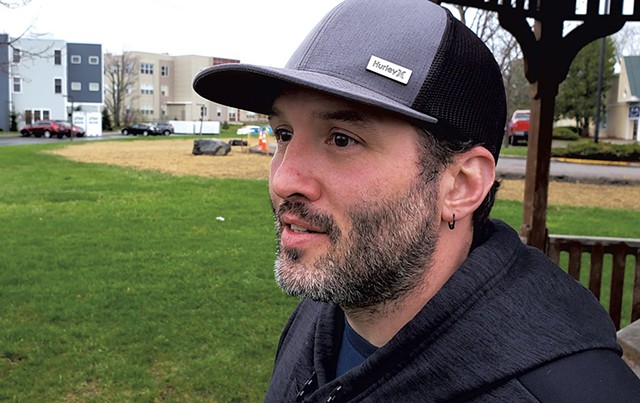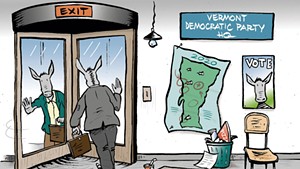
- Kevin Mccallum
- Jamie Wool
Jamie Wool's epic bender had come to an inglorious end. The Essex resident had been imprisoned after a two-week binge on alcohol, crack cocaine, methamphetamine and heroin. The withdrawal was brutal. The 26-year-old man shook and vomited and had diarrhea. He had no appetite, even though he hadn't eaten in days.
A friend and fellow inmate told him he looked like "absolute death," Wool recalled. The friend offered him a "bump," about a milligram of ground-up buprenorphine, in a piece of folded paper. The prescription drug, used to treat opioid-use disorder, is commonly smuggled into prisons.
As unlikely as it sounds, given his illicit drug use, Wool said he was initially hesitant to turn to a manufactured opioid, having lost three friends to oxycodone overdoses. But as his symptoms worsened, he felt as though he had no other choice. He snorted the packet of powder, and his life changed forever.
"It was enough to instantly make me feel better," Wool recalled last week. "That was kind of the beginning, for me, of understanding the power that buprenorphine had to help me detox."
That was more than a decade ago. Now sober after a long, challenging road to recovery, the Williston resident felt compelled to share his experience with state legislators in late March as they discussed H.162, which would decriminalize possession of buprenorphine without a prescription.
In recent years, public policies in Vermont have been gradually shifting to address the opioid crisis as a health concern rather than a law enforcement issue. But the "bupe" bill, while a logical next step for some, has run into opposition from a top health official. The bill is still in committee in the House and appears unlikely to become law this year — though backers in the legislature say they are undeterred.
Chittenden County State's Attorney Sarah George announced last summer that her office would no longer prosecute people for possession of black-market buprenorphine, noting that formulations of the drug "are intended to be life-saving."
"They block the craving for heroin or other street opioids, minimize the chance of relapse, and help individuals reduce or abandon their use of heroin or other opioids, which in [turn] reduces crime, the likelihood of fatal overdoses and recidivism," she wrote to local police chiefs.
Burlington Mayor Miro Weinberger and others have credited the policy change, along with other strategies, with helping to halve the county's opioid deaths last year — bucking a statewide trend.
H.162 would make it legal to possess small amounts of buprenorphine statewide. Selling and possessing larger quantities would remain felonies.
When Wool learned the legislation faced an uphill battle in Montpelier, including staunch opposition from Public Safety Commissioner Tom Anderson, he drove to the Statehouse to testify before the House Human Services Committee.
Before he spoke, Wool listened to Vermont Health Commissioner Mark Levine express strong concerns about the bill. Levine testified that the notion of decriminalizing buprenorphine would be a "slam dunk" in any other state, because they lack Vermont's robust opioid treatment programs.
Vermont's "nationally renowned" hub-and-spoke model of providing medically assisted treatment has no waiting list, meaning people can get needed treatment within 72 hours, he said.
"So there is no reason for someone to be on the streets with nothing else to turn to but illicitly obtained buprenorphine," Levine told legislators.
While decriminalizing buprenorphine might give some people a safer option than heroin or fentanyl, Levine said, the data were "limited and often contradictory." Vermont would be the first state to decriminalize its possession.
Studies suggest that buprenorphine, while a potent opioid, is rarely used to get high. The drug creates less of a euphoric effect, has a low risk of overdose and prevents painful withdrawal from opioids.
Nevertheless, Levine said he worried the change would reduce the motivation for people to enter effective treatment programs, and it might increase their incentive to sell prescribed drugs on the black market.
Levine added that, in an attempt to get high, people could inject bupe instead of taking it orally, risking serious health consequences including heart infection.
But Wool said he couldn't understand how the state's top health officer could call the idea a slam dunk for other states but not for Vermont.
For someone who has lost 21 people close to him to opioid addiction in the last 20 years, including his sister and brother, Wool said he felt the commissioner's opposition to the bill lacked sympathy for the families of those who have died. He expected a health commissioner to fully support whatever would make it easier for addicts to choose an option safer than heroin or the synthetic opioid fentanyl.
"We have to somehow compete with these heroin dealers who will literally meet anyone, anywhere, anytime," Wool told Seven Days.
Levine's testimony struck several advocates as aimed more at defending the state's reputation for innovation than for acknowledging areas where it could improve.
"I think the commissioner is so in love with the hub-and-spoke system that his love has blinded him to the shortcomings of that system," said Tom Dalton, executive director of Vermonters for Criminal Justice Reform. "That's why I think he's able to recognize the value of this in any other state but Vermont."
Addicts can often wait days or weeks before getting treatment, Dalton said.
Such delays trouble Rep. Ann Pugh (D-South Burlington), chair of the House Human Services Committee and a cosponsor of H.162. "He will say people can get access for treatment in 72 hours," she said of Levine. "If you're an addict, that's a waiting list."
Brenda Siegel, a former Democratic candidate for governor who lost her nephew to an overdose and advocates for the decriminalization of buprenorphine, said she found Levine's defense of the current system "jaw-dropping."
While Chittenden County slashed its death rate in half in 2018, other counties remain in a full-blown crisis, she said.
"I will tell you, in Windham County there is nothing to be proud of," Siegel noted, citing its 60 percent spike in overdose fatalities last year.
State figures show that the 8,000 people in active treatment in Vermont represent an estimated 30 percent of the people who need it, she said. The state's model doesn't work for most, Siegel said, adding that officials seem reluctant to acknowledge "we need different and innovative practices to reach the rest."
The bill's lead sponsor, Rep. Selene Colburn (P/D-Burlington), said it would usher in an important but modest change to keep people in recovery and out of the criminal justice system.
"I just don't see how this bill dramatically alters the landscape we have, other than saying to people who are desperately trying to stay alive in the middle of a crisis, 'You're not a criminal for doing that,'" she said.
Colburn said she, too, was "shocked" by Levine's opposition to the bill but believes it still enjoys wide support.
"I don't think his testimony killed the bill at all," she said. At the very least, Chittenden County's experience so far demonstrates that "all hell is not going to break loose if we do this," Colburn said.
Since Levine's testimony, Pugh's committee put H.162 "on a back burner for a while" because of other pressing business, including moving forward on bills passed by the Senate, she said. But last week the committee took up the issue again, and Pugh said she's confident the members will vote it out soon.
The House Judiciary Committee had previously amended the bill to add penalties for juveniles in possession of buprenorphine, including a loss of driving privileges.
The Human Services Committee still has concerns to address. One is whether the bill should apply to any form of buprenorphine or just to the brand-name drug most common in Vermont, Suboxone, which is a combination of buprenorphine and the overdose-reversal drug Naloxone.
Another unresolved issue is the amount of the drug that should be exempted from criminal possession charges. Currently, possession of less than 100 times what is considered a therapeutic dose of 36 milligrams is a misdemeanor. So, if that were simply decriminalized, possession of up to 3.6 grams would become legal.
"[That] sounds like you could open a store," Pugh quipped.
The committee seemed to be moving toward exempting a lesser amount, perhaps a two-week supply.
Committee members also sought to better understand why the current system, which is supposed to strictly account for all buprenorphine prescribed, is supplying a thriving black market.
Some clinics may provide "less scrutiny," enabling patients to sell their supply, Dr. Kim Blake of the Howard Center testified last Thursday.
"That's troubling," responded Rep. Jessica Brumsted (D-Shelburne), "because you worry that if we were to decriminalize, will it become more prevalent?"
The bill missed crossover, the date by which legislation must be sent to the other legislative chamber to have much chance of passing this year. Colburn said that was disappointing but understandable, given the complexity of the issue and shift in drug policy it represents.
Pugh acknowledged this makes it challenging to get the Senate to take up the bill. Senate President Pro Tempore Tim Ashe (D/P-Chittenden) agreed that passage this year "does not look good," given that some Senate committees have already begun winding down their work. He added that it wouldn't be "responsible" for the Senate to "rubber-stamp without any review a bill that the House has had for four months."
In that case, the bill would wait until next session.
Gov. Phil Scott believes the decriminalization conversation has merit, but he is concerned about possible unintended consequences of the bill, particularly the likelihood that it would reduce the opportunities for treatment intervention, spokesperson Rebecca Kelley said.
Wool favors removing any obstacle to recovery that might keep people alive. Buprenorphine saved his life not because it's a miracle drug, he said, but because it gave him time to face the demons that caused him to use in the first place. These include reconciling with his estranged father while in prison and confronting a past sexual assault that had haunted him for years.
Buprenorphine "showed me there was another path," Wool said, "and it helped me stay alive until I was ready to take it."
Disclosure: Tim Ashe is the domestic partner of Seven Days publisher and coeditor Paula Routly. Find our conflict-of-interest policy here: sevendaysvt.com/disclosure.
Correction, May 2, 2019: Possessing up to 3.6 grams of buprenorphine without a prescription would become legal if the misdemeanor standards were decriminalized. A previous version of this story contained an error.














Comments (5)
Showing 1-5 of 5
Comments are closed.
From 2014-2020, Seven Days allowed readers to comment on all stories posted on our website. While we've appreciated the suggestions and insights, right now Seven Days is prioritizing our core mission — producing high-quality, responsible local journalism — over moderating online debates between readers.
To criticize, correct or praise our reporting, please send us a letter to the editor or send us a tip. We’ll check it out and report the results.
Online comments may return when we have better tech tools for managing them. Thanks for reading.